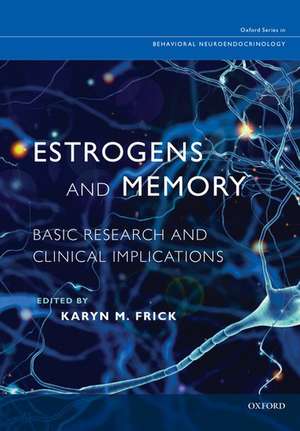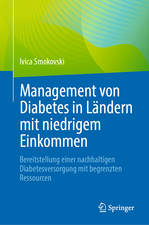Estrogens and Memory: Basic Research and Clinical Implications: Oxford Series in Behavioral Neuroendocrinology
Editat de Karyn M. Fricken Limba Engleză Hardback – 20 feb 2020
Preț: 919.86 lei
Preț vechi: 1144.24 lei
-20% Nou
Puncte Express: 1380
Preț estimativ în valută:
176.01€ • 184.27$ • 145.64£
176.01€ • 184.27$ • 145.64£
Carte disponibilă
Livrare economică 04-10 martie
Preluare comenzi: 021 569.72.76
Specificații
ISBN-13: 9780190645908
ISBN-10: 0190645903
Pagini: 516
Dimensiuni: 257 x 183 x 31 mm
Greutate: 1.09 kg
Editura: Oxford University Press
Colecția OUP USA
Seria Oxford Series in Behavioral Neuroendocrinology
Locul publicării:New York, United States
ISBN-10: 0190645903
Pagini: 516
Dimensiuni: 257 x 183 x 31 mm
Greutate: 1.09 kg
Editura: Oxford University Press
Colecția OUP USA
Seria Oxford Series in Behavioral Neuroendocrinology
Locul publicării:New York, United States
Recenzii
Estrogens and Memory: Basic Research and Clinical Implications provides a very important, current overview of a field that has opened up the brain as an important target of sex hormones that affect cognitive, emotional, and motor functions throughout the brain and not just reproduction. The book includes chapters by leading researchers on this topic and covers basic molecular and behavioral mechanistic studies as well as clinical findings."
How do estrogens regulate memory? It depends. Estrogens and Memory: Basic Research and Clinical Implications introduces readers to important questions concerning the interaction of long-term and rapid mechanisms that regulate estrogenic effects on memory, neuroprotection, and maintenance of brain function in the face of stressors, brain damage, disease, and reduced responsiveness during aging. In addition to supporting the idea that estrogens are rapid neuromodulators of memory, the pros and cons for hormone therapy in women are highly debated, and differing opinions and putative reasons for conflicting results are clearly presented and discussed in depth. This book would form a solid foundation for a course on the effects of estrogens on the neurons underlying memory formation."
Understanding the role of estrogens in mediating memory is key to elucidating critical questions of human health such as: How are estrogens involved in the memory aspects of neuropsychiatric disorders? Are those memory circuits established before birth? What are the underlying causes of Alzheimer's disease in women? Can estrogens be used therapeutically to maintain memory function as we age? This outstanding compendium of research from scientists at the cutting edge of estrogen research provides the tools to think about all of these important questions and more. Organized to present a translational and trans-species perspective, it moves from the molecular to the behavioral as it presents a lucid and deep exposition of current knowledge that will inspire and underscore estrogens' key role in memory, one of the essential attributes that make us human."
How do estrogens regulate memory? It depends. Estrogens and Memory: Basic Research and Clinical Implications introduces readers to important questions concerning the interaction of long-term and rapid mechanisms that regulate estrogenic effects on memory, neuroprotection, and maintenance of brain function in the face of stressors, brain damage, disease, and reduced responsiveness during aging. In addition to supporting the idea that estrogens are rapid neuromodulators of memory, the pros and cons for hormone therapy in women are highly debated, and differing opinions and putative reasons for conflicting results are clearly presented and discussed in depth. This book would form a solid foundation for a course on the effects of estrogens on the neurons underlying memory formation."
Understanding the role of estrogens in mediating memory is key to elucidating critical questions of human health such as: How are estrogens involved in the memory aspects of neuropsychiatric disorders? Are those memory circuits established before birth? What are the underlying causes of Alzheimer's disease in women? Can estrogens be used therapeutically to maintain memory function as we age? This outstanding compendium of research from scientists at the cutting edge of estrogen research provides the tools to think about all of these important questions and more. Organized to present a translational and trans-species perspective, it moves from the molecular to the behavioral as it presents a lucid and deep exposition of current knowledge that will inspire and underscore estrogens' key role in memory, one of the essential attributes that make us human."
Notă biografică
Dr. Frick is a behavioral neuroscientist and neuroendocrinologist. She is a Professor of Psychology at the University of Wisconsin-Milwaukee, and an Adjunct Professor of Pharmacology and Experimental Therapeutics at the Medical College of Wisconsin.

































